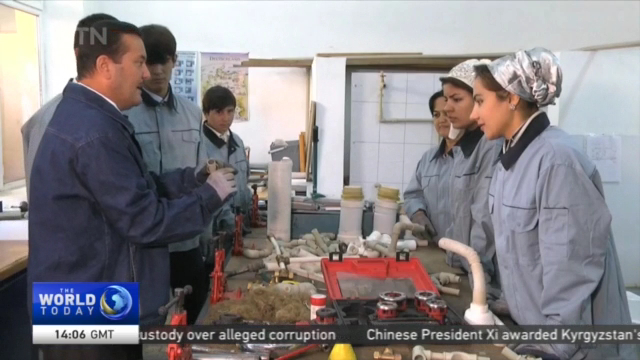
22:23, 13-Jun-2019
CICA Summit: Tajik men seek better pay amid sluggish economy
Updated
17:30, 09-Jul-2019

This weekend, an important security summit focused on peace and stability in Asia will take place in Dushanbe, Tajikistan. It's the fifth of such gathering since its launch in 1999. However, what its attendees may not notice is the number of the country's men, sharply declining – as many leave for better-paying jobs abroad. CGTN's Natalie Carney reports.
Dushanbe is eager to present the right appearance to arriving world leaders. Yet behind the scenes, many Tajiks are struggling under a challenged economy. Lack of job opportunities has driven more than 1 million Tajiks abroad in search of work. The remittance they send back was equivalent to nearly 35% of GDP last year, making Tajikistan one of the world's most remittance-dependent countries. 31-year-old Parvina lives with her four children in a village 60 kilometers west of Dushanbe, near the Uzbek border. Shortly after her youngest was born, her husband left to find a higher paying job in Russia.
PARVINA WIFE OF TAJIK MIGRANT WORKER "It's been more than two years since he left us for Russia. He's working as a chef's assistant in a cafe. His salary is approximately 20-thousand Russian rubles. He sends 5-thousand to us, 5-thousand he uses on himself. He wouldn't send me an amount like 10-thousand. The most is 5-thousand -- never more than that. The costs are very high there for him."
48-year-old Gulnora used to work in a market while her husband drove a taxi. But after her health started to fail and hospital costs ate up all their savings, her husband decided to try his luck in Russia.
GULNORA WIFE OF TAJIK MIGRANT WORKER "There are some women whose husbands have emigrated and are not sending money home. Of course, all of them have families and children to provide for. The women are working everywhere. They are trying to feed their children -- trying to do something. They are even taking their children to work. They're trying to solve problems by themselves."
NATALIE CARNEY DUSHANBE "Practically every household in this village has lost either one or two male members to migration. This common trend seen in villages all across the country is not only changing families but long-standing cultural traditions in this largely patriarchal society."
Political analyst Rashid Abdullo says a knock-on effect from the collapse of the Russian ruble in 2014 drastically reduced the money men were able to send back from Russia – and forced many women to take up traditionally male roles.
RASHID ABDULLO POLITICAL ANALYST "From 2013 up to today, the amount of money transferred to Tajikistan from Russia has decreased threefold. In 2013, the total amount was more than 4 billion dollars. The following year, it was cut down to almost half."
In the country's fields, women outnumber men. And in Dushanbe vocational training centers, women are learning traditionally male jobs.
ZARINA NABIEVA APPRENTICE PLUMBER, MOTHER OF TWO "I'm learning this skill so I can fix any plumbing problems at home. Because when you call a plumber, either he doesn't come at all or arrives too late. So if I can do it by myself, not only can I do it better, but I can also save money."
While women may be picking up the economic slack left behind by migrating men, Tajikistan remains the poorest of the former Soviet countries. Many argue that the government needs to prioritize its spending to create more economic opportunities for Tajiks at home. Natalie Carney, CGTN, Dushanbe, Tajikistan.
SITEMAP
Copyright © 2018 CGTN. Beijing ICP prepared NO.16065310-3
Copyright © 2018 CGTN. Beijing ICP prepared NO.16065310-3